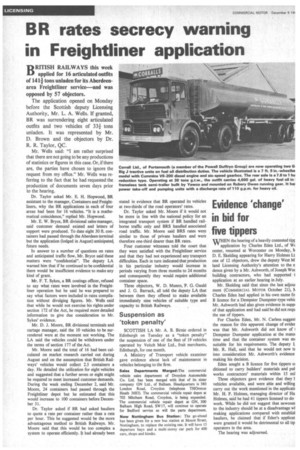BR rates secrecy warning in Freightliner application
Page 34

If you've noticed an error in this article please click here to report it so we can fix it.
BRITISH RAILWAYS this week applied for 16 articulated outfits of 141+ tons unladen for its Aberdeenarea Freightliner service—and was opposed by 57 objectors.
The application opened on Monday before the Scottish deputy Licensing Authority, Mr. L. A. Wells. If granted, BR was surrendering eight articulated outfits and two vehicles of 334 tons unladen. It was represented by Mr. D. Brown and the objectors by Dr.
R. R. Taylor, QC.
Mr. Wells said: "I am rather surprised that there are not going to be any productions of statistics or figures in this case. Or, if there are, the parties have chosen to ignore the request from my office." Mr. Wells was referring to the fact that he had requested the production of documents seven days prior to the hearing.
Dr. Taylor asked Mr. E. H. Hopwood, BR assistant to the manager, Containers and Freightliners, why the BR applications in each of four areas had been for 16 vehicles. "It is a mathematical coincidence," replied Mr. Hopwood.
Mr. E. W. Bryce, BR divisional sales manager, said customer demand existed and letters of support were produced. To date eight 30 ft. containers had passed through the Aberdeen terminal but the application (lodged in August) anticipated future needs.
In answer to a number of questions on rates and anticipated traffic flow, Mr. Bryce said these matters were "confidential". The deputy LA warned him that if he continued to be confidential there would be insufficient evidence to make any kind of grant.
Mr. F. T. Sykes, a BR. coatings officer, refused to say what rates were involved in the Freightliner operation but he said he was prepared to say what factors were included in rates compilation without divulging figures. Mr. Wells said that while he would not exercise his rights under section 172 of the Act, he required more detailed information to give due consideration to Mr. Sykes' evidence.
Mr. D. J. Moore, BR divisional terminals and cartage manager, said the 10 vehicles to be surrendered were at the moment not working. The LA said the vehicles could be withdrawn under the terms of section 177 of the Act.
Mr. Moore said the total of 16 had been calculated on market research carried out during August and on the assumption that British Railways' vehicles would collect 2.5 containers a day. He detailed the utilization for eight vehicles and suggested that a further seven or eight might be required to meet increased customer demands. During the week ending December 2, said Mr. Moore, 24 containers had passed through the Freightliner depot but he estimated that this would increase to 100 containers before December 31.
Dr. Taylor asked if BR had asked hauliers to quote a rate per container rather than a rate per hour. This he suggested would be the more advantageous method to British Railways. Mr. Moore said that this would be too complex a system to operate efficiently. It had already been stated in evidence that BR operated its vehicles at two-thirds of the road operators' rates.
Dr. Taylor asked Mr. Moore if it would not be more in line with the national policy for an integrated transport system if BR handled railborne traffic only and BRS handled associated road traffic. Mr. Moore said FIRS rates were similar to those of private hauliers and were therefore one-third dearer than BR rates.
Four customer witnesses told the court that they were satisfied with the Freightliner service and that they had not experienced any transport difficulties. Each in turn indicated that production in his particular industry would increase in periods varying from three months to 24 months and consequently they would require additional container space.
Three objectors, W. D. Munro, P. G. Gauld and J. G. Barrack, all told the deputy LA that between them they offered to make available immediately nine vehicles of suitable type and capacity to British Railways.












































































































